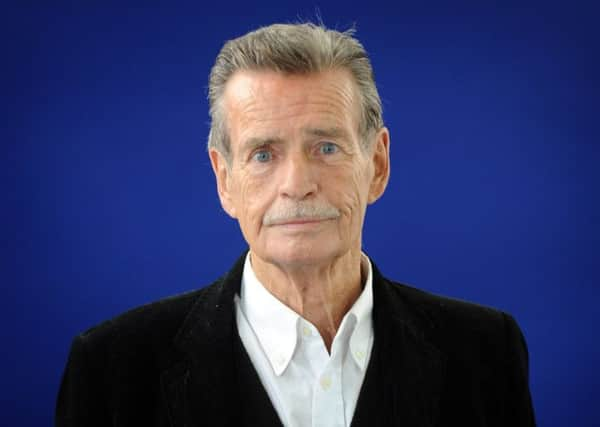Festival Review: Aye, Write


I don’t know about you, but there are times when I want to run screaming from the independence referendum debate; to get away from its repetitive political snarl, its blockhead blocked-out certainties, its predictable pundits.
And yet I don’t want to run too far away either, because it’s too important. All I want is to hear something I don’t know, a point of view I haven’t heard before, some tranche of experience or relevant memory. For all of that, this weekend, there was only one place to go: Aye Write.
Advertisement
Hide AdIt’s wrong to stereotype, but they do literary festivals differently in Glasgow. Or at least, it’s hard to imagine the opening event at the Edinburgh International Book Festival ending, as Aye, Write did, with Friday night’s salute to Nelson Mandela, running over by half an hour, with – imagine! – members of the public dancing with singer Marah Louw on the Mitchell Theatre stage.
But back to the indyref debate – if only because Saturday afternoon’s discussion, “Scotland and England: What’s the Difference?”, was one of the best I’ve heard of its kind and I’ve been wondering why ever since.
There were three Yeses on stage (chairwoman Ruth Wishart, Lesley Riddoch and Michael Fry) to a solitary No (Conservative MP Rory Stewart), but it didn’t matter, because none of them was predictable or entirely political, which is surely the reason it all worked.
Fry – who had in a preceding event expounded on how Scotland held on to its own identity even at the high water mark of Britishness in the 19th century – came to the Yes side from the Right, Riddoch from the communitarian, grassroots Left. Her critique in her book Blossom is that Scotland needs a form of governance tailored to its own particular needs, rather than the straitjacket of the British state, and that models that would serve our democracy better can be found all over the place, but particularly in Scandinavia.
Stewart introduced himself by apologising “for being three of the most unpopular things in Scotland today – an Old Etonian, a politician and a Tory”. He is, I have long thought, one of the most impressive Tories north or south of the Border. Indeed, only last night was he expounding his thesis that Hadrian’s Wall had damagingly divided an essentially homogenous country – what he calls “the Middlelands”, the vast swathe of territory north of the Humber and south of the Tay.
He hardly bothered making those points in any depth, confining himself instead to the present. Drive south across the Border, he pointed out, and his patch of Cumbria is more egalitarian, not less, with more family farms and big estates, poorer soil, and fewer people. He couldn’t understand why those on the Left had lost any sense of solidarity with the north of England, and claimed that the debate wasn’t really about nationhood but refighting the Left’s battles of the 1980s.
Advertisement
Hide AdThe really odd thing? Stewart was actually ahead on points until he made a cardinal error. He actually said that London was “the greatest city on Earth”. In Glasgow. Cue boos all round.
They wouldn’t have come, I know, from either Damian Barr or Gerry Hassan. In their event, Hassan suggested that the generally bad-tempered indyref debates were because Scotland’s vestigial Calvinism has bequeathed it “a problem with empathy”. We also love hearing stories of how more egalitarian we are, how we love to hold power to account and believe in educational opportunity and welcome asylum seekers: all myths, he insisted. A Scotland without Thatcher would not be significantly different. It would, though: without Thatcher, Barr wouldn’t have been able to write his memoir Maggie and Me. And he wouldn’t have had to have extra security because of threats to him before his Motherwell reading on Friday. Another serious problem with Scottish empathy right there.
Advertisement
Hide AdIf anyone can fix that, William McIlvanney can. In any normal country, he’d be our president already. Preposterously good-looking (even at 77), a wonderfully self-deprecating, brilliant reader of his own work, “the leading novelist of his generation” according to Allan Massie, he has enough empathy to burn off the excess in Grangemouth-like flares. A slight exaggeration there, but not by much, as anyone who heard his reading on Saturday night could confirm. It was one of those moments when an audience stills to collectively catch the thought put into words, here not just in his short stories, but into prose pieces such as one about the dignity with which his father faced terminal cancer. McIlvanney is, he revealed, planning to write just three more books – “a couple of Laidlaws, and an awful big, final book that will complete the Docherty trilogy”.
Earlier, Clare English interviewed Tam Dalyell about the books that had influenced him the most. Children’s writer Geoffrey Trease’s Bows Against the Barons, in which Robin Hood takes on the feudal establishment, apparently made a big impact, and not just because Trease was his teacher. And the reason he became a constitutional obsessive in the first devolution bill debates was, it turns out, all down to his having read Morley’s Life of Gladstone while doing his National Service. “Are you writing anything now?” asked English. “The obituaries of my contemporaries?” the great man replied.